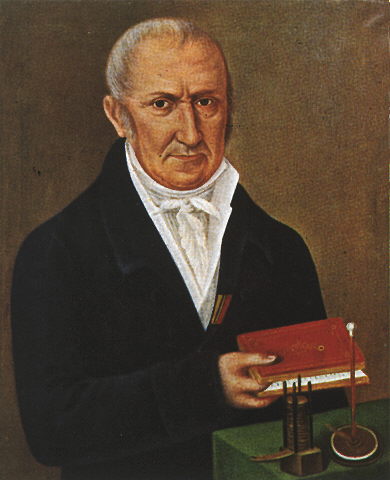Alessandro Volta – Inventor of the Battery
Already used your smartphone today, opened your laptop or checked the pedometer on your smartwatch? Batteries are so taken for granted in our everyday lives that we rarely realize their constant use. To commemorate their value, February 18 has therefore been designated International Battery Day. On this day in 1745, Italian Alessandro Volta was born, the inventor of the prototype electric battery. Volta's life story is fascinating not only because of his invention; he was also a brilliant strategist when it came to advancing his academic career and research.

The son of a lesser landed nobleman, he was supposed to become a lawyer to ensure the continuity of his family - at least that was what his guardian, the archdeacon of Como Cathedral, had decreed. Volta, however, followed his passion, became interested in Newton's gravitational research, the phenomenon of electricity and devoted himself to scientific experiments. His chronic lack of money drove him to invent numerous scientific instruments that already made him famous. These included the electrophor, a device for generating static electricity (1775), and he also succeeded in discovering methane gas (1776). However, his first efforts to obtain the chair of experimental physics at the University of Pavia in 1775 failed due to a lack of connections. Volta was not discouraged by this. Instead, the then thirty-year-old successfully applied to the Habsburg governor general of Lombardy as a reformer of the educational system: more Italian than Latin, more arithmetic and more love poems of literature were to break up the traditional educational canon. The calculation worked, and 1778 Volta achieved his goal and was appointed to the coveted chair.
He took a similarly strategic approach in publicizing his invention of the first prototype battery. Volta doubted the existence of animal electricity, which the Bolognese physician Luigi Galvani claimed to have demonstrated in twitching frogs' legs in 1791. Instead, he was convinced that the source of electricity must be found in inorganic matter. In 1799, he succeeded in proving this with the so-called "voltaic column". A single element of the Volta column is called the Volta element and is constructed exactly like a battery cell today, consisting of an anode, electrolyte and cathode, but Volta used copper or silver and zinc or tin rags soaked in a salt solution as the electrolyte. To prove electricity, Volta did not shy away from using his own body and tested the electric charge with his tongue! Now it was a matter of skillfully publicizing his discovery. In 1800, Volta notified the Royal Society in London, but he chose French as the language. Here, too, there was a calculation behind it: No one less than Napoleon Bonaparte learned of the invention. The potentate, who was highly interested in the natural sciences, invited Volta to Paris on November 7, 1801, so that he could demonstrate his invention there. The reward was international fame, a senatorship and a generous pension. It was easy to live with, but Volta himself did not live to see his highest honor: in 1897, the naming of the SI unit of electrical voltage as the "volt" made him immortal.
Volta's invention became world famous and in some cases led to cruel experiments: in 1803, for example, Galvani's nephew tested the strength of electrical charges from batteries on the corpse of a felon sentenced to death in Newgate Prison in London. The resulting scandal inspired Mary Shelley to write the story of a character named Frankenstein... Incidentally, the term "battery" comes from the military. The battery experienced its first boom in the 19th century as a drive for the new automobiles. So electromobility also looks back on a long tradition.
Text: Alexandra Kohlhöfer
